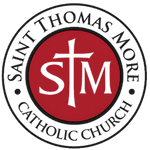Our Patron Saint
-
-
Saint Thomas More
Beatified 1886 Canonized 1935
Thomas More was born in 1478 in London, and began to practice law in 1502. He was married, and a father of four. By all accounts, he was a devoted husband and father. Unusual for the time, he made sure that his daughters were given the same classical education as his son.
Eventually, his work as a writer and lawyer brought him to the court of King Henry VIII, where by 1529, he had been elevated to the position of Lord Chancellor.
Thomas was fiercely loyal to King Henry VIII, and worked tirelessly defending the Church in England. The relationship between him and the King began to unravel when More did not support the king seeking an annulment from his wife, Catherine. Seeing the writing on the wall, Thomas resigned in 1532 rather than support King Henry VIII’s agenda.
In 1534, Thomas was ordered to recognize King Henry VIII as the Head of the Church of England and his wife, Anne, as Queen. Thomas refused to acknowledge any of it, and imprisoned in the Tower of London for over a year while waiting for trial on charges of treason. His trial began on
1 July 1535, and he was found guilty after only 15 minutes of deliberation.
On 6 July 1535, Thomas More stepped up to where he was to be beheaded. He joked to his executioners to help him up the scaffold, but that he would, “see himself down.” He then made his final statement, proclaiming one of his most well known quotes, “I die the king’s good servant, but God’s first.” Saint Thomas More is remembered and honored as a man with tremendous integrity and heroic virtue.
Saint Thomas More,
Patron Saint of Our Parish,
Pray for Us!Occupy your mind with good thoughts,
or the enemy will fill it with bad ones.
***
One of the greatest problems of our time
is that many are schooled, but few are educated.
***
The things we pray for, good Lord,
give us grace to labor for.
***
Lord, give me a sense of humor,
so that I may take some happiness in this life and share it with others.
-
 St. Thomas More
St. Thomas More
-
